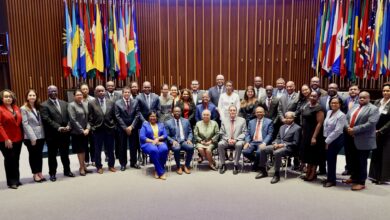NASSAU, Bahamas, Jul 2, CMC – A senior official of the Trinidad-based Caribbean Public Health Agency (CARPHA) says the economic costs associated with food-borne illnesses in the Caribbean are “very high” and can range anywhere from two to US$40 million annually.
“When we look at the Caribbean, the average annual cost associated with food-borne illnesses is $21 million. That is sometimes more than the entire budgets of some Caribbean countries,” said CARPHA’s Programme Manager for Tourism and Health Programmes, Surveillance Disease Control and Prevention, Dr. Lisa Indar.
“Sometimes we don’t think of food safety as a problem. We think it is just the case of having mild diarrhoea, but we really need to look at it as a serious public health problem because of the type of costs associated with it,” she told a three-day Advanced Food Safety Training and “Train-the-Trainer” Certification Course.
She told delegates to the workshop organised by the ministries of health and tourism that a recent CARPHA study showed that one -in-49 persons in the Caribbean will actually get a food-borne illness during their lifetime. She said in some countries, the incidences are “actually higher”.
Indar said the Caribbean’s positioning as the most tourism-dependent region in the world, makes it more susceptible to the effects of food-borne illnesses and that those risks are further increased as a result of the large gatherings associated with events such as Junkanoo, Carnival, Christmas and Easter celebrations.
“All of this is further exemplified by globalisation. mAs we improve in our trade and our travel, food-borne disease goes with us. It has no boundaries. The Caribbean is one of the most travelled areas not just for the sun, sand and sea, but also for business, so as we increase in trade and travel and globalisation and mass production, food-borne disease risks actually increases.
“It is a serious public health issue. It is costly to economies, but the good news is that it is preventable and that is why we are here today to look at all of the practices and measures that we can employ as health and as tourism officials to prevent this public health issue,” she added.
The World Health Organization (WHO) statistics show that 1.8 million persons contract a diarrheal disease annually – 70 per cent of whom become ill due to food-borne illnesses.
“The thing is, it is still only a fraction that is actually reported as many people who get a diarrheal illness do not actually go to a doctor as they tend to self-treat. So that alone tells you how much under-reporting is occurring,” Indar said.
According to the Center for Disease Control (CDC) in the United States of America, about 50 per cent of U.S. travellers who visit the Caribbean, get a traveller’s diarrheal illness.
“That is not good for our regional tourism industries. That is not good for our economies as traveller’s diarrhoea can ruin a visitor’s stay. It is a given that tourism is our bread and butter, but as visitors increase, the potential for locals and visitors to transmit or acquire illnesses, also increases, and so we have to do the things necessary to reduce potential risks,” the CARPHA official said.”
She said food safety seminars, such as the one hosted jointly by the Ministry of Health and the Ministry of Tourism, can help in that regard.
“Food Safety encompasses everything we do from the time we start preparing food whether at the animal farm or the fish farm until it is actually served and it describes all of those different processes.
“Everyone of us, not just health, tourism, the environment, policymakers, transport persons, trade persons, regional citizens involved in food preparation, every one of us, is an important component for ensuring food safety.
“Again there is a solution (as) most of these illnesses are preventable through good systems of monitoring and training in food safety. If we improve our food safety, we will reduce illnesses amongst our travellers and we will reduce illnesses amongst locals while making our countries better countries overall.”
Indar said the advanced food safety course covered all of the principles of food safety from purchasing down to service.
“We lined our training with real examples of outbreaks we have investigated over the last 10 years in the Caribbean in order to inspire (the persons involved in the training) to improve their food safety measures so that we can make The Bahamas and the rest of the Caribbean a better country and a better region.
“Improving our food safety will further allow us to improve food safety and food security which is one of our Millennium Development Goals and it will also then create a healthier, safer, tourism products and lead to more sustainable tourism,” she added.






